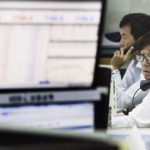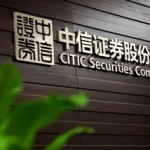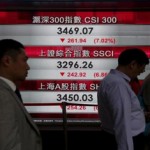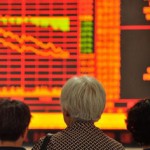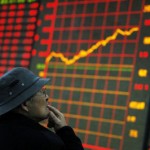Fear Spreads as China’s Finance Firms Face Arrests

-
“People are worried” as hedge funds, traders, CSRC targeted
-
At least 16 connected to finance world caught up in crackdown
The high-drama highway arrest of a prominent hedge fund manager. Seizures of computers and phones at Chinese mutual funds. The investigations of the president of Citic Securities Co. and at least six other employees. Now, add the probe of China’s former gatekeeper of the IPO process himself.
The arrests or investigations targeting the finance industry in the aftermath of China’s summer market crash have intensified in recent weeks, creating a climate of fear among China’s finance firms and chilling their investment strategies. At least 16 people have been arrested, are being investigated or have been taken away from their job duties to assist authorities, according to statements and announcements compiled by Bloomberg News.
The authorities’ goal is to root out practices such as insider trading as part of China’s anti-corruption campaign, and a desire by “some in the political leadership to find scapegoats to blame” for the market crash, according to Barry Naughton, a professor of Chinese economy at the University of California in San Diego.
“Together these are creating uncertainty and anxiety that can only undermine the effort to make these markets work better,” he said by e-mail.
New Products
Chinese authorities have long encouraged funds and brokerages to create new investment products to keep the finance industry along a development path. Now that’s been halted by regulators’ raids, arrests by police and anti-corruption investigations of even regulators themselves by the Communist Party’s disciplinary committee. JPMorgan Chase & Co. and Credit Suisse Group AG have scaled back products that allowed foreign investors to bet on stock declines. At least one Chinese research firm has withdrawn information it used to provide to the market, calling it “too sensitive.”
The government’s response to the market crash was intervention: state-directed purchases of shares, a ban on initial public offerings and restrictions on previously allowed practices, such as short selling and trading in stock-index futures. Next, high-ranking industry figures came under scrutiny as officials investigated trading strategies, decried “malicious short sellers” and vowed to “purify” the market.
Policy makers say “now we’re innovating, so you can all come in — using high-frequency trading, hedging, whatever — to play in our markets,” Gao Xiqing, a former vice chairman of the China Securities Regulatory Commission, told a forum in Beijing on Nov. 6. “A few days later, you say no, the rules we made are not right, there are problems with your trading, and we’re putting you in jail for a while first.”
‘Hardly Predictable’
“That makes our markets hardly predictable — such rules won’t bring stability,” said Gao, who later led China’s sovereign wealth fund and now teaches at Beijing-based Tsinghua University.
The products scaled back by Credit Suisse and JPMorgan are called synthetic shorts, which enabled clients to indirectly wager against Chinese stocks through Hong Kong’s stock exchange link with Shanghai, according to a memo to investors seen in September and people with knowledge of the matter. A scarcity of stocks that could be used for synthetic shorting led to limited usage of the product, said one of the people. The banks scaled back the offerings, which were legal, after Chinese authorities restricted short-selling and trading in index futures. Spokeswomen at both firms declined to comment at the time and again when contacted this week.
Stopped Trading
About a third of China’s futures-focused hedge funds had to stop trading as regulators restricted practices such as short-selling. Howbuy Investment Management Co. in September said it stopped providing data on premature fund liquidations because the information was too sensitive. The Shanghai-based fund research firm had previously said almost 1,300 hedge funds closed this year amid the stock rout.

In the latest probe announced last week, Yao Gang, a vice chairman at the CSRC, is under investigation for “alleged serious disciplinary violations,” the Communist Party’s Central Commission for Discipline Inspection said. Known as China’s “King of IPOs,” he supervised China’s initial public offerings until earlier this year, when he changed to approve bonds and futures, according to Caixin magazine. He joins two otherCSRC officials being investigated, one of whom, Zhang Yujun, was formerly the general manager of the Shanghai and Shenzhen stock exchanges.
Unannounced Inspections
The securities regulator carried out unannounced inspections of several Chinese investment firms including Harvest Fund Management earlier this month, taking away hard drives and mobile phones, according to people familiar with the seizures. Police in Shanghai also confiscated computers and froze $1 billion of shares in listed companies connected to Xu Xiang, the manager of Zexi Investment known as “hedge fund brother No. 1,” who was arrested Nov. 1 on a highway between Shanghai and Ningbo.
Among Xu’s fellow money managers who performed well this year, anxiety has been palpable following his arrest, according to hedge fund manager Lu Weidong, chairman of Xinhong Investment based in China’s southern city of Dongguan. Lu’s Fuguo No. 1 fund was the best-performer among the 236 Chinese multi-strategy hedge funds from June to August, according to Shenzhen Rongzhi Investment Consultant Co., which tracks the data.
It isn’t uncommon for Chinese money managers to trade on unpublished information, according to Lu. Everybody that ever traded on such tips would “restrain themselves a bit” going forward, Lu said by phone.
“People are worried,” he said.
While Zexi Investment’s Xu kept such a low profile that few knew what he looked like until a photo of him in handcuffs when he was arrested as part of a probe of alleged insider trading went viral on the Internet, he has long attracted attention for his funds’ exceptional performance, which had been “an outlier from a statistical point of view,” according to Yan Hong, Shanghai-based director of China Hedge Fund Research Center.
Amid tumult in China’s stock market, five funds managed by Xu yielded an “astonishing” 249 percent on average this year through September, according to Shenzhen Rongzhi data. The Shanghai Composite Index fell 5.6 percent in the same period, after a 41 percent market plunge since June 12 wiped out earlier gains. His returns prompted speculation about the methods and strategies he used, according to analysts including Hao Hong, chief China strategist at Bocom International Holdings Co. in Hong Kong.
Surpassed Expectations
“The extent of this round of clampdown in the financial industry has surpassed everybody’s expectations,” he said. “Over the longer term, the clampdown on corruption in the financial industry will level the playing field in the market for smaller investors.”
Others caught up in the probes include executives at trading firms Yishidun International Trading and Huaxin Futures, who were arrested after police alleged Yishidun made 2 billion yuan ($316 million) in “illegal profit,” according to a report by the Xinhua News Agency, citing the Ministry of Public Security.
Bloomberg News hasn’t been able to contact any of the 16 individuals through their firms, the CSRC or public records to get their responses to the allegations at any time since the announcement of their arrests or investigations. Officials at all of the companies either declined to comment or couldn’t be contacted. Citic Securities has repeatedly declined to comment on the cases of its employees.
‘It’s Unprecedented’
“We’ve never seen anything like it in the past,” said Fraser Howie, a co-author of “Red Capitalism,” a book on China’s financial system, referring to the scale and scope of the probes. “Without question, it’s unprecedented.”
There have been no shortage of bad practices over the past 20 years, including manipulation and offenses such as insider trading, for the authorities to investigate — had they chosen to do so, Howie said. “It begs the question: where were the investigations in past years?”
Trading volume of China’s CSI 300 Index and CSI 500 Index futures have plunged after authorities in early September raised margin requirements, tightened position limits and started a police investigation into bearish bets. A total of 181 futures funds suspended trading in October amid liquidity scarcity, up from 165 in September and accounting for 34 percent of all funds tracked by Shenzhen Rongzhi, which provides the data monthly.
China entered a bull market this month as investors began returning to stocks. The Shanghai Composite Index has risen 22 percent from its Aug. 26 low.
“Everybody knows that insider trading and market manipulation is something that repeated crackdowns have failed to eradicate in China’s stock market,” China Hedge Fund Research’s Yan said by phone. “It could be just the tip of the iceberg. For this market to grow to a relatively mature level, like the U.S., we still have a fairly long way to go.”
Source: Bloomberg – Fear Spreads as China’s Finance Firms Face Arrests









